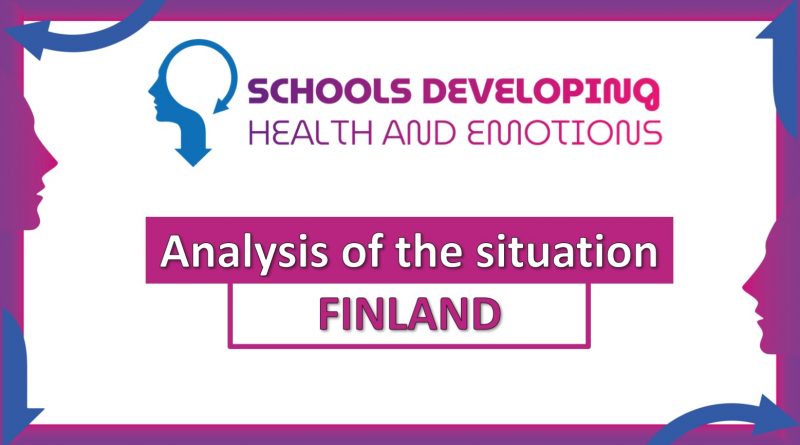Analysis of the situation: Finland
In the frame of Phase I, each project organisation had to analyse the existing situation on each project country on the promotion of health and emotional education in secondary schools and their institutionalization in its country. Here you have a summary of the text written by Maijamäen Koulu concerning the situation of Finland:
Legislation:
In Finland education is one of the cornerstones of the welfare society and Finnish are very proud of their educational system as it offers equal opportunities for education for all. And most of all, education from pre-primary to higher education is free of charge in Finland.
Finnish school system promotes children’s ́ development, health and wellbeing from the early childhood education and care until to the higher levels. At the same time life-long learning is taking place. Schools’ responsibilities in educating children and promoting well-being are regulated by legislation in the Basic Education Act.
Finland has a national curriculum at every schooling stage from early childhood education until high school level and it is approved by Finnish National Agency of Education. Every municipality also must provide their own local curriculum, where they present their own specialties and how every subject is taken into practice. It gives local education authorities to arrange teaching in the best possible way which suites the local circumstances.
Finland has an autonomous subject, health education, for upper secondary school levels. It is taught by a subject teacher one hour every week for three years. On lower levels of secondary school health education is included in other subjects, for example biology and environmental studies. The health education as a subject is regulated only in the national curriculum, where states the main aims and goals which should be achieved before compulsory education is finished.
In our Maijamäen School no topic is a taboo. We see our students as whole and teach health education in a way that our students can reflect the topics through their own point of view. It is important always to see the three dimensions of health, no matter the phenomena, issue or area of health what we are learning.
Implementation:
In the Basic education act is said, that all the teaching, including textbooks and other materials are free for students. It is left for the teacher to choose, which book is used, and which other necessary materials are provided. Every school in Finland has its own budget for schooling materials and in our school, we can have new books every 6 to 9 years in health education. One student will use the same book for three years; one book covers all the topics for three-year
studies in the subject.
The Finnish Institute of Health and welfare in cooperation with Ministry of Education and Culture carries out every second year a nationwide School Health Promotion study. The purpose of the study is to make the planning and evaluating stronger considering health promotion activities in school both local and national levels. The questionnaire is answered anonymously, so that helps students to give more specific and truthful answers. After the study is finished, the results are shared by the Finnish Institute of Health and welfare, and every school participating has chance to go through it and pick few main points what to take under deeper look.
In cooperation with school health care workers, meetings are held when necessary. For example school nurse takes place in a meeting if a student has too much absence from school and in cooperation the purpose is to figure out help and possible actions to improve the student’s situation.
Training of teachers:
Finnish teachers are highly educated and strongly committed to their work. Teachers are required to have a master’s degree, and their initial training includes teaching practice. Teachers who teach health education in secondary schools have specialized on the subject in university. Health education teachers will need minimum 60 credits in health sciences (school health education).
The Finnish education system is based on trust in teachers and teacher education. Because of the consistent quality of their training, teachers can be given extensive freedom in developing their own work. Teachers have the power to decide which teaching methods and learning materials they want to use.

